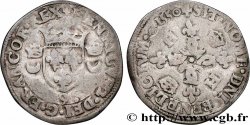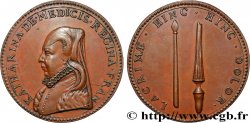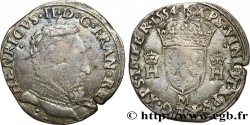v19_0705 - HENRY II Teston à la tête nue, 1er type 1556 Rouen
MONNAIES 19 (2004)
Начальная цена : 600.00 €
Назначить цену : 900.00 €
Цена реализации : 785.00 €
Количество ставок : 3
Максимальная предлагаемая цена : 1 001.00 €
Начальная цена : 600.00 €
Назначить цену : 900.00 €
Цена реализации : 785.00 €
Количество ставок : 3
Максимальная предлагаемая цена : 1 001.00 €
Тип Teston à la tête nue, 1er type
Дата: 1556
Монетный двор / Город: Rouen
Количество отчеканенных монет: 10786
Металл: silver
Проба: 898 ‰
Диаметр: 31 mm
Ориентация осей монеты: 8 h.
Вес: 9,50 g.
Комментарии о состоянии
Ce teston est frappé sur un flan très large et laisse apparaître l’essentiel des grènetis extérieurs. Les reliefs sont dans l’ensemble très nets, sauf sur l’H couronnée accostant la partie gauche de l’écu de France où l’on doit noter une faiblesse de frappe. Le portrait du roi est expressif
Ссылки в каталоге: :
Происхождение:
Exemplaire provenant de la vente Leu 60, n° 679 (seul exemplaire recensé par Stéphan Sombart)
Лицевая сторона
Аверс: легенда: HENRICVS. II. D. G. FRAN. REX, (LÉGENDE COMMENÇANT À 7 HEURES).
Аверс: описание: Buste cuirassé et allongé de Henri II à droite, la tête nue.
Аверс: перевод: (Henri II, par la grâce de Dieu, roi des Francs).
Обратная сторона
Реверс: легенда: + XPS. VINCIT (MM) XPS. REGNAT. XPS. IMP. 1556.
Реверс: Описание: Écu de France couronné accosté de deux H couronnées ; à la pointe de l'écu la lettre d'atelier.
Реверс: перевод: (Le Christ vainc, le Christ règne, le Christ commande).
Комментарий
Exemplaire de qualité exceptionnelle pour ce type monétaire.








 Cообщить об ошибке
Cообщить об ошибке Распечатать страницу
Распечатать страницу Отправить мой выбор
Отправить мой выбор Задать вопрос
Задать вопрос Consign / sell
Consign / sell
 Информация
Информация









